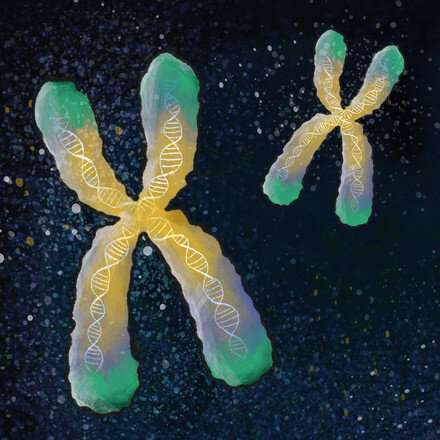Better stress management is beneficial to newborns

A group of researchers from Charité - Universitätsmedizin Berlin have been able to show that maternal psychological wellbeing during pregnancy has a positive effect on newborn infants. Increased telomere length suggests a reduced rate of cell aging, which could have an effect on children's future health. Results from this study have been published in the American Journal of Psychiatry.
A variety of pregnancy-related factors can have an impact on child development. Until now, researchers had primarily focused on the negative effects of stress, excess weight and poor nutrition—and how these might affect, say, placental function, premature birth and children's general health. At the cellular level, various pregnancy-related factors can have a direct impact on 'telomeres,' cellular structures which protect the ends of chromosomes during cell division and can be lengthened by the enzyme telomerase. Telomere length is a molecular biology marker of cell aging which is linked to life expectancy and a range of age-related disorders. Although the effects of maternal stress have been widely studied, data on protective maternal factors and their positive effects on child development remain limited.
Researchers led by Prof. Dr. Sonja Entringer of Charité's Institute of Medical Psychology have been able to show that the mother's ability to cope with stress during pregnancy—her 'psychological resilience'—is linked to telomere length. The more positive a mother's attitude during pregnancy, the longer the children's telomeres. "Positive maternal psychological characteristics are biologically embedded and have a protective effect on the fetus," says Prof. Entringer.
In an earlier study, the researchers examined the way in which maternal stress during pregnancy affects telomere length in their offspring. The current study, which saw Prof. Entringer's team work with a team of researchers led by Nobel Laureate Elizabeth Blackburn of the University of California and colleagues in Finland, had access to a large study population comprising 650 mother and child pairs. Telomere length was determined at birth, using cells from cord blood. Positive attitude in the face of stress was determined using a 'resilience index', which also took into account the pregnant women's psychological wellbeing and perceived social support.
"This study underlines the importance of maternal psychological wellbeing during pregnancy in terms of the developmental programming of lifelong health and disease, and the significance of improved psychosocial support measures during pregnancy," explains Prof. Entringer, who is also an Associate Professor at the University of California. Prof. Entringer was awarded a European Research Council 'Starting Grant' in 2016, which enabled her to set up and develop her own research group. The researchers are currently conducting more detailed investigations into the molecular mechanisms underlying the biological embedding of psychosocial effects in the cells of unborn children. As a next step, they are planning to conduct an interventional study on stress reduction in the day-to-day lives of pregnant women.
More information: Glenn Verner et al, Maternal Psychological Resilience During Pregnancy and Newborn Telomere Length: A Prospective Study, American Journal of Psychiatry (2020). DOI: 10.1176/appi.ajp.2020.19101003


















